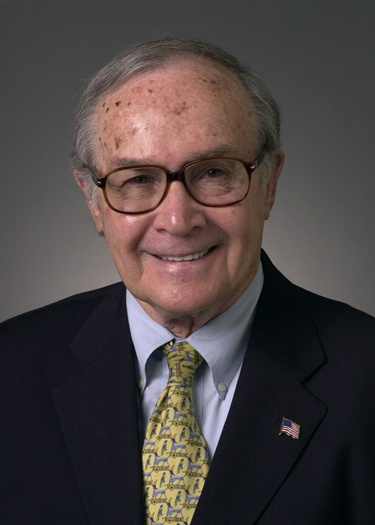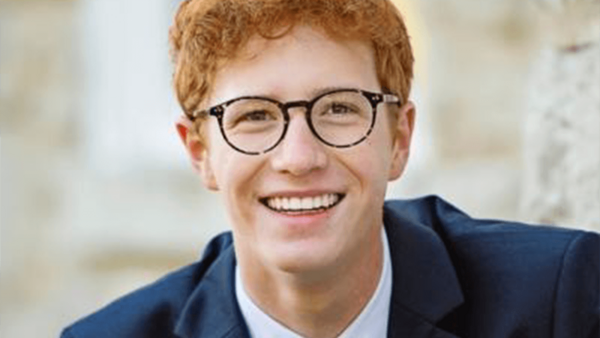In memoriam: Notre Dame Trustee Newton Minow

Newton N. Minow, a member of the University of Notre Dame’s Board of Trustees for 53 years, distinguished lawyer and former chair of the Federal Communications Commission, died Saturday (May 6) in Chicago. He was 97.
“Newt Minow was a great public servant, a visionary Trustee, a recipient of an honorary degree from Notre Dame and a dear friend to me personally,” the University’s president, Rev. John I. Jenkins, C.S.C., said. “I came to know him best through our membership on the Commission on Presidential Debates, where Newt was revered as someone who, consistent with other aspects of his career, sought to serve the public good through the medium of television. He brought to all his endeavors a great intellect, a concern for the best interests of our nation and genuine goodwill, so that he not only commanded respect, but also inspired affection in all who were fortunate to know him.”
In an extraordinary career spanning six decades, Minow made seminal contributions to the expansion of television technology and satellite communications, the creation of the Public Broadcasting Service (PBS) and the development of televised debates between candidates for the U.S. presidency.
But it was two words that Minow uttered at just age 35 in a speech to the National Association of Broadcasters (NAB) for which he is most remembered.
Soon after President John F. Kennedy appointed Minow chair of the Federal Communications Commission (FCC), the young attorney delivered a critical assessment of commercial television on May 9, 1961, at the annual NAB convention. He said, in part:
“When television is good, nothing — not the theater, not the magazines or newspapers — nothing is better. But when television is bad, nothing is worse. I invite each of you to sit down in front of your television set when your station goes on the air and stay there for a day without a book, without a magazine, without a newspaper, without a profit and loss sheet or a rating book to distract you. Keep your eyes glued to that set until the station signs off. I can assure you that what you will observe is a vast wasteland.”
Those last two words were applauded by people who complained of the violence and frivolity seen on television, and criticized by others — particularly in the industry — as an elitist attack on entertainment that the American public enjoyed. Sherwood Schwartz, the creator of the television comedy “Gilligan’s Island,” is said to have named the charter boat piloted by the Skipper and Gilligan the S.S. Minnow as an insult to Minow.
Whatever one’s point of view, Minow’s description of television as a “vast wasteland” was a critique that arose from his hope that this powerful medium would serve the highest interests of this nation and its people. His life was in many ways dedicated to that hope.
Born in Milwaukee in 1926, Minow served in the U.S. Army during World War II, advancing to the rank of sergeant. After the war, he earned bachelor’s and law degrees from Northwestern University and began his legal career in 1950 at the Chicago firm Mayer, Brown & Platt.
Minow left the firm to clerk for U.S. Supreme Court Chief Justice Fred M. Vinson, and then became assistant counsel for Illinois Gov. Adlai Stevenson and served on Stevenson’s first two presidential campaigns. He was a partner in the law firm Stevenson, Rifkind & Wirtz and, after working on Kennedy’s 1960 president campaign, he was appointed chair of the FCC, serving from March 1961 to June 1963. He played a primary role in the passage of the All-Channel Receiver Act, which led to an increase in the number of television stations in the U.S. and helped launch what is now PBS.
He also persuaded Congress to pass legislation clearing the way for communications satellites, an achievement he considered of far greater significance than the speech he delivered to the NAB.
“I went to the White House and told President Kennedy that these communications satellites were more important than sending men into space, because they would send ideas into space and ideas last longer than people,” he told the New York Times. “I testified 13 times in Congress for the legislation to create the corporations and the funding. I think this is more important than anything else I’ve ever done, for its impact on the future of the world.”
After the famous 1960 presidential debate between Kennedy and Richard M. Nixon, there were no debates for the elections of 1964 to 1972. The FCC then waived equal time provisions for debates and they were revived, with Minow serving as chair for the debates sponsored by the League of Women Voters in 1976 and 1980.
In 1987, Minow helped create the bipartisan Commission on Presidential Debates, the sponsor of all debates since then, and served as the commission’s vice chair for 25 years. He co-authored a book in 2008 titled “Inside the Presidential Debates: Their Improbable Past and Promising Future.”
After his FCC tenure, Minow worked for two years as an executive with Encyclopaedia Britannica, then joined the Chicago firm Sidley Austin and served as its managing partner from 1965 to 1991. He was a senior counsel in the firm at the time of his death. He also served as honorary consul general of the Republic of Singapore.
Minow first served on Notre Dame’s Board from 1964 to 1977, and then rejoined six years later and became an Emeritus Trustee in 1996. He was the University’s first Jewish Trustee and was awarded an honorary doctor of laws degree in 1994. Minow was a trusted adviser to three Notre Dame presidents — Rev. Theodore M. Hesburgh, C.S.C., and Rev. Edward A. Malloy, C.S.C., as well as Father Jenkins. He also served on the board of his alma mater, Northwestern.
Among his many corporate, civic and public service appointments, Minow served as chair of the Carnegie Corporation and the RAND Corporation.
President Barack Obama, whom Minow recruited to work as a summer associate at Sidley Austin in 1988, conferred the Presidential Medal of Freedom on Minow in 2016. Minow was the recipient of 11 honorary degrees in addition to the one he received from Notre Dame, the television and radio industry’s Peabody Award and the Woodrow Wilson Award for Public Service.
Minow is survived by three daughters, Nell, Martha and Mary, and three grandchildren. His wife of 73 years, Josephine, died last year.
Arrangements are pending.
Latest ND News Wire
- Division of Student Affairs awards scholarships to student leadersThe University of Notre Dame’s Division of Student Affairs recently recognized 15 junior undergraduate students with scholarships for the 2025-26 academic year for their demonstrated leadership and ongoing commitment to the holistic development of Notre Dame students.
- Notre Dame celebrates new pope; Father Dowd offers prayersRev. Robert A. Dowd, C.S.C., president of the University of Notre Dame, offered his prayers for Pope Leo XIV, elected by the College of Cardinals today in Vatican City as the 267th pontiff of the Catholic Church.
- Clare Cullinan named valedictorian, Bennett Schmitt selected as salutatorian for the Class of 2025Clare Cullinan of South Bend, Indiana, has been named valedictorian and Bennett Schmitt from Jasper, Indiana, has been selected as salutatorian of the 2025 University of Notre Dame graduating class. The 180th University Commencement Ceremony will be held May 18 (Sunday) in Notre Dame Stadium for graduates and guests. During the ceremony, Cullinan will present the valedictory address, and as salutatorian, Schmitt will offer the invocation.
- Notre Dame’s Fightin’ Irish Battalion receives Department of Defense award as nation’s top Army ROTC programThe United States Department of Defense honored the University of Notre Dame’s Army ROTC Fightin’ Irish Battalion as the nation’s top Army collegiate program for the 2023-24 academic year. This will be the first time the unit has received the department’s Educational Institution Partnership Excellence Award, which recognizes the program’s achievements in recruiting, educating, training and commissioning leaders of character to be the next generation of military officers.
- Senior James Reintjes named 2025 Yenching ScholarUniversity of Notre Dame senior James Reintjes has been named a 2025 Yenching Scholar. He is one of 114 Yenching Scholars overall, representing 40 countries and regions around the globe. He is Notre Dame’s 12th Yenching Scholar and its 9th since 2018.
- Junior Cade Czarnecki named 2025 Phi Beta Kappa Key into Public Service ScholarUniversity of Notre Dame junior Cade Czarnecki is among 20 recipients of a 2025 Key Into Public Service Scholarship from Phi Beta Kappa. He is Notre Dame’s fifth Key Into Public Service Scholar since the program was established in 2020.













